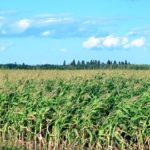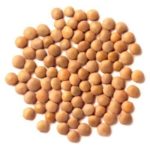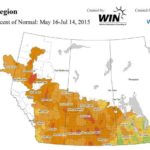CNS Canada –– Short-term corn and soybean futures have been bouncing due to dryness in the eastern U.S. corn belt, but as crops move into harvest, prices will likely fall, according to Brian Rydlund, market analyst at CHS Hedging Inc. The corn market is primarily being moved by ethanol bidders and buyers, Rydlund said. “Export-wise,

CBOT weekly outlook: Corn, soy to weaken as harvest nears
Crops varied, but production down overall: tour
Regina — Crop conditions across Western Canada ranged from good to poor during CWB tours of the Prairie provinces over the week ended July 24, with ‘variability’ the key word in any discussion on this year’s prospects. Production on canola and wheat will be down overall, but perhaps by not as much as originally thought.
Rain too late to bring back yields: CWB crop tour
Eastern Saskatchewan — no recovery seen By Jade Markus, Commodity News Service Canada Grenfell, Sask. — As the CWB crop tour sees an increasing number of wheat fields suffering from dryness earlier this season, it brings the question: will rain help? According to farmers, the answer is likely “no.” Fields of wheat in the south
Crops varied in eastern Sask: CWB tour
Carlyle, Sask. — The effect of this years dry weather is becoming increasingly apparent as the CWB crop tour moves into Saskatchewan. Lack of moisture is visible in southwestern Manitoba and southeastern Saskatchewan, the CWB tour found. However, dryness hasn’t been all bad in some areas — participants from the 2014 crop tour recall a
Manitoba crops decline moving west: CWB tour
Brandon, Man. — As this year’s CWB crop tour moves west through Manitoba, crops have started looking thinner as the area has been drier than in the eastern part of the province.. Canola around Killarney doesn’t look good compared to its eastern Manitoba counterparts. Canola in western Manitoba is still flowering. The later bloom is

Early Sask. lentil, pea harvests likely to support prices
CNS Canada –– Saskatchewan’s dryness could likely mean an earlier harvest and smaller yield for pea and lentil crops this year, according to a regional crop specialist. That means new-crop prices will be supported, said Chuck Penner, president at LeftField Commodity Research. Old crops are disappearing, he said, and the market will become active as

Rye prices seen high, but stable
CNS Canada –– Rye crops have been reacting to Saskatchewan’s heat and dryness by developing faster than they would normally be — but healthy crops elsewhere appear to be helping to keep global prices stable, at least for the time being. U.S. crops may stop rye prices from moving too turbulently, at least until Canada’s

Prairies should see rain this week, except where needed most
CNS Canada –– Most of the Prairies are expected to get well-timed rain that will maximize growing potential, except for where it’s needed most, according to a U.S. weather specialist. Saskatchewan Drew Lerner, president at World Weather Inc., based near Kansas City, said the driest areas in southwestern Saskatchewan will not get rain. “That region
Manitoba buckwheat in need of higher temperatures
CNS Canada — Manitoba’s buckwheat crops are off to a good start, little affected by storms, but now the crops need heat. According to Rejean Picard, a provincial farm production extension advisor at Somerset, Man., the crops started off strong, as June’s weather provided good establishing conditions. The same can’t be said for July, however.

Pitting supply management against U.S. subsidies seen as ‘unfair’
CNS Canada — How will Canada’s supply management system stack up against America’s domestic supports if the Trans-Pacific Partnership (TPP) comes to fruition? It’s a question that hasn’t been answered, say some experts from Canada’s farming institutions. “It would be completely unfair if we have to compete with lower prices, because those lower prices are

